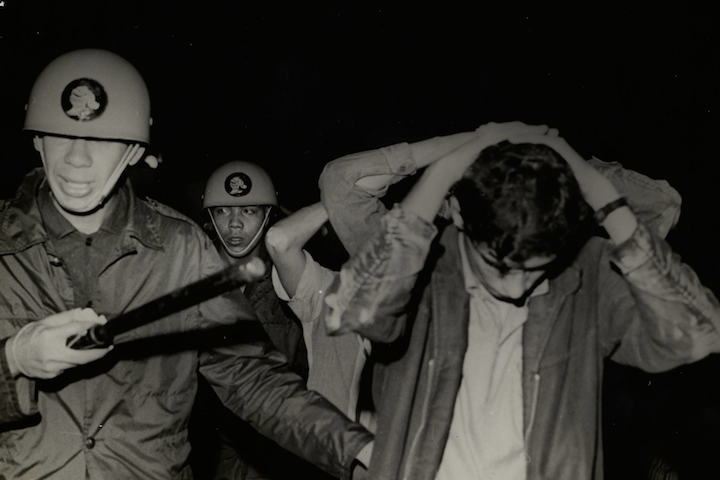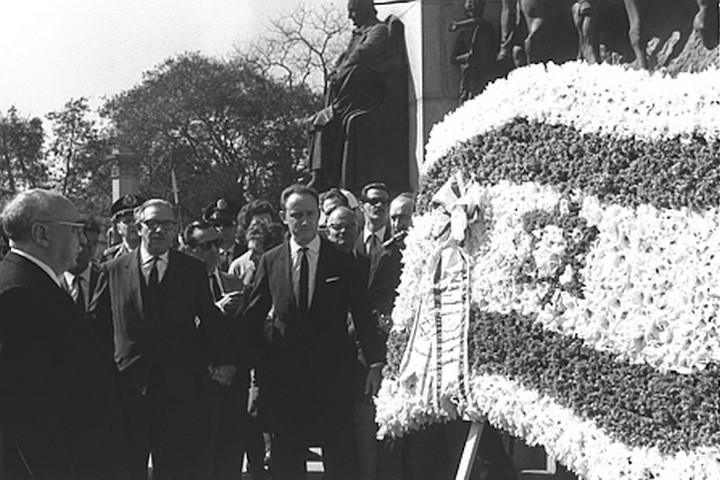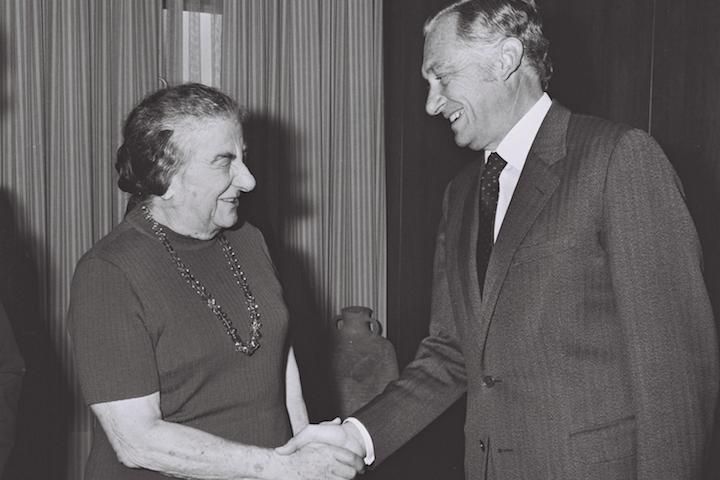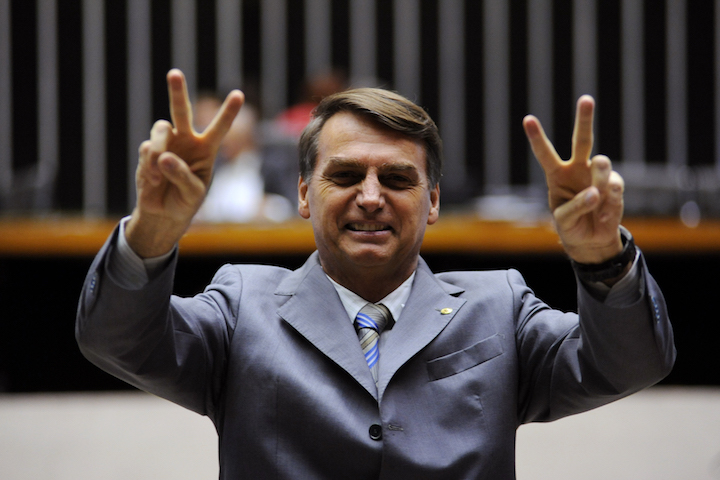Archival documents show how Israel helped prop up the Brazilian junta, supplied it with weapons and military expertise, and even signed a number of nuclear agreements.
By Eitay Mack

Just under a month ago, following an especially tumultuous election season, Brazilians elected Jair Bolsonaro as president of their country. Bolsonaro has been a member of the National Congress, Brazil’s parliament, since 1990, where he was part of a group of vocal, extreme-right backbenchers who longed for the days of the military dictatorship that ruled Brazil from 1964 until 1985.
His election was welcomed by the Israeli right, with Prime Minister Benjamin Netanyahu going so far as to announce he would attend Bolsonaro’s swearing-in ceremony in January.
A haphazard transition
Those who long for the era of the dictatorship ignore the fact that Brazilian security forces disappeared hundreds and arrested and tortured thousands of its own citizens. Brazil served as a model for other murderous regimes, and the military dictatorship intervened in other countries in South America and and supported their dictatorships. It backed Pinochet’s coup and the suppression of dissent in Chile, aided the military coup in Bolivia, helped Uruguay put down internal revolts, and helped coordinate Operation Condor, in which the dictatorships of the Southern Cone worked in concert to eradicate left-wing activists and guerillas.
Brazil is likely the only country in Latin America that did not undergo a process of self-examination following the dark years of dictatorship. A law passed in 1979 granted immunity to officers responsible for the junta’s crimes. And while a National Truth Commission was established decades later, in 2011, as opposed to other similar commissions, it did very little investigating. In fact, the commission mostly summarized reports by human rights organizations, testimonies of victims of the dictatorship, and CIA documents handed over by the Obama administration.
Brazil’s power structures, its society, and its economy have changed very little since the transition to democracy. Part of the blame surely lies with the left-wing and centrist parties that have ruled the country for the past 33 years, and which feared confrontation with the military establishment. The left’s failure in the most recent elections only added insult to injury: the Worker’s Party, which ruled Brazil since 2003, permitted Luiz Inácio Lula De Silva to run for president from his prison cell, where he was serving time for corruption. The party changed its candidate at the last minute, replacing De Silva with economist Fernando Haddad. It wasn’t enough to defeat Bolsonaro.

The lack of public discussion about the dictatorship and the little information available to the public about that period created a lacuna in the collective memory. Thus it is no surprise that Bolsonaro supports torture and annulling Brazil’s democracy, along with attacking women’s rights, the LGBTQ community, left-wing parties, and workers. And yet, to millions of voters, Bolsonaro is not a threat. He is a politician with his feet planted firmly on solid ground—someone who can rescue Brazil from its crises.
Dictatorship with a parliamentary veneer
Israeli Foreign Ministry documents at the Israel State Archives reveal that the Jewish state, like many others, were rather disinterested in Brazil’s human rights record during the dictatorship. Israeli diplomats in Brazil focused on hasbara efforts and promoting Israeli culture, and held repeated talks about moving the Brazilian embassy to Jerusalem.
Following the military coup on April 1, 1964, the Israeli embassy put together a document that said the coup “was swiftly planned and implemented, and led, for 24 hours, not only to the fall of Goulart (the president at the time), but also to the suppression of all leftist elements […] Brazil is today in a transitional state that can be defined as a military dictatorship with a parliamentary veneer.” On June 16, 1965, Aryeh Eshel, director of Latin American affairs at the Foreign Ministry, wrote that he hopes “the current regime in Brazil lasts.”
A cable sent by the Israeli embassy on September 26, 1966 on anti-dictatorship student protests reported that “the slogans are always political and against the regime. There is hardly a doubt that leftist elements are exploiting the bitterness that exists among the students.” In another telegram sent on December 15, 1966, the embassy wrote that “no one cares what happens to ‘democracy’ in Brazil.” A few months later, a telegram sent to Jerusalem complained about the difficulty of promoting Israeli propaganda, since “there is no possibility to use student groups in our favor, since these organizations were disbanded due to their leftism. The same goes for workers’ organizations, which in effect no longer exist.”

Following the 1967 war, Prime Minister Levi Eshkol came up with and examined a plan to foment the “emigration of Arab residents from the disputed territories to Brazil.” After talks with the Israeli embassy in Brazil, Eshkol wrote on August 8, 1967: “These talks give me reason to believe that with intensive efforts, thousands, if not tens of thousands of Arab families, especially from the Gaza Strip, could emigrate to Brazil.”
Since the Israeli Defense Ministry refuses to release documents regarding Israel’s defense exports, and Brazil has not conducted a serious public investigation into the matter, very little information has been revealed regarding the security ties between the two countries at the time. The little information that has been exposed points to strong ties: Brazil’s security forces used Israeli Uzi submachine guns, and the National Truth Commission revealed that intelligence agents from the National Intelligence Service of Brazil (SNI) — who were primarily responsible for torture, oppression, and crimes committed by the regime — received training in Israel.
Looking away from anti-Semitism
According to the documents, the two countries exchanged military attachés. In 1973, Israel used the São Paulo Air Show to present its Gabriel missiles, electronic devices, and more. The documents also indicate that the two sides negotiated the sale of Israeli military products to Brazil, among them ships, helicopters, armaments, communications equipment, electronics, Shafrir and Gabriel missiles, aircraft engine repairs, radar systems, electronic fences, military training, and an delegation of military advisers.
Less known is the fact that the two countries entered into a nuclear pact for peaceful purposes. Israeli nuclear scientists went to work in Brazil, and even Shalhevet Freier, head of the Israeli Atomic Energy Commission, paid a visit to the country in the early 1970s. The first nuclear agreement between Israel and Brazil went into effect on August 10, 1964, just four months after the military coup. Complementary agreements were signed in 1966, 1967, and 1974.

A document dated to December 19, 1975, authored by Gideon Tadmor, deputy director of the Center for International Cooperation at the Foreign Ministry, attests to the decline in nuclear cooperation between the two countries, in part because of the desire of the Brazilian regime to play down its relations with Israel. According to the document, Brazil expressed “disappointment with the kind of assistance we proposed, which was not exactly what they were looking for.” Despite the cooperation between the two countries, in June 1981 Brazil claimed that Israel had leaked intelligence on a Brazilian deal to sell uranium and nuclear equipment to Iraq. The Israeli Foreign Ministry believed the Mossad was behind the leak.
Similar to Israel’s relationships with Bolivia, Paraguay, Chile, and Argentina, its ties with Brazil were not shaken by allegations of anti-Semitism, nor by the fact that Nazis who fled Europe following World War II were living in the country. In 1967, Brazil appointed Miera Pena to serve as the Brazilian ambassador to Israel, despite the fact that both Israel’s foreign and defense ministries suspected he was a Nazi. In December 1973, Israel’s Foreign Ministry was alerted to the fact that Brazilian police were tapping diplomats’ phone calls and having them followed in order to locate remittances from Brazil. In November 1975, the Foreign Ministry received a tip on the possibility that security forces in Sao Paolo were planning to carry out some kind of action against the Jewish community to prove a lack of loyalty among Brazil’s Jews.
In its attempt to court Brazil, Israel tried to brand itself as a crucial partner in the struggle against global terrorism, among other reasons, to convince the Brazilians that the PLO was a terrorist organization that must not win formal recognition. To do so, the Israeli Foreign Ministry passed on “intelligence” to officials in Brasília. For example, Israeli diplomats sought to spread rumors that refugees from Angola were training to infiltrate Brazil and carry out subversive acts, and that the PLO was training and giving support to guerrilla groups across South America (in truth, only a few Argentinian guerrilla groups trained with the PLO).
Israel’s Foreign Ministry even asked members of Kibbutz Bror Hayil, home to immigrants from Brazil, to share their experiences with the Brazilian Ministry of Foreign Affairs on being on the “front line of the free world against waves of aggression supported by the communist world.” But were communists actually at the gates? The persistent use of communism and global terrorism to justify the political and security ties between the countries was so cynical that already in 1966 the Foreign Ministry wrote that “according to our estimates, there is no organization that threatens the current regime” in Brazil.

Immediately following the military coup, Israel was comfortable with its strong ties with Brazil. A decade later, however, the Foreign Ministry had a soberer view of things. In a telegram from May 28, 1975, Israel’s ambassador at the time noted that “Brazil’s goal in its ties with Middle Eastern countries is entirely pragmatic, and focuses on promoting necessary economic, trade, and financial interests as defined by the president… these interests necessitate cultivating ties with Arab countries, especially with oil-producing countries.”
When it came to security exports, the ambassador claimed that “influential circles in the top military brass are sympathetic to Israel and have, on many occasions, been interested in forging closer and more meaningful ties with the IDF and with our military industries… Political considerations make it difficult and in some cases prevent transactions, and the sympathy of the military and the public is not enough to overcome political obstacles.” Therefore, he suggested that “we should concentrate on products whose Israeli identity can be disguised.”
Ties between the two countries began to deteriorate in March 1980, 16 years after the establishment of the dictatorship, when the military regime recognized the PLO as the representative of the Palestinian people and an essential partner in the negotiations to determine the future of Palestine. That line was reiterated by the Brazilian foreign minister during a meeting with then-Israeli Foreign Minister Yitzhak Shamir in September 1981.
Cut from the same cloth

Netanyahu was quick to congratulate Bolsonaro on his election victory, telling him in a phone conversation that “I am sure that your choice will lead to great friendship between the two peoples and to closer ties between the two countries.” Bolsonaro, who won much of the Evangelical vote in his country, said he would move Brazil’s embassy to Jerusalem, while Netanyahu said he would attend the president-elect’s inauguration ceremony.
Netanyahu and Bolsonaro, both of them anachronistic leaders, regularly resort to a “politics of fear.” The former does so when it comes to Iran or “Arabs turning out in droves to the polling stations.” Bolsonaro uses the crisis in Venezuela, the LGBTQ community, and whatever communists are still around as scapegoats. Both delegitimize human rights organizations and left-wing parties and their incitement may end up costing lives. Bolsonaro refuses to believe that the Cold War ended and that there is no fear that communists will take over Brazil and the world. Netanyahu refuses to believe that the 1948 war ended and that Israel’s existential, political, and security situation in 2018 has changed dramatically.
Eitay Mack is an Israeli human rights lawyer working to stop Israeli military aid to regimes that commit war crimes and crimes against humanity. This article was first published in Hebrew on Local Call. Read it here.
[Editor’s note: In accordance with our legal obligations, this article was sent to the IDF Censor for review prior to publication. We are not allowed to indicate if—and if, then where—the article was censored.]
